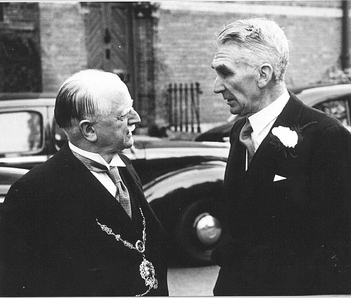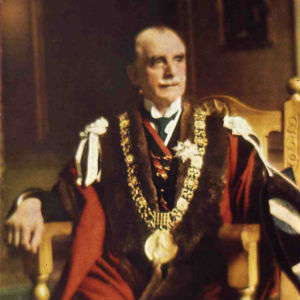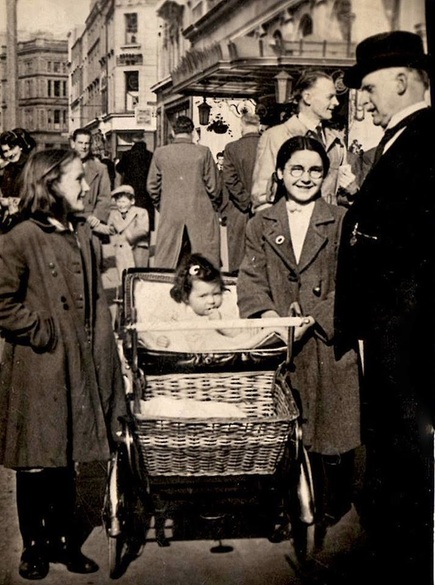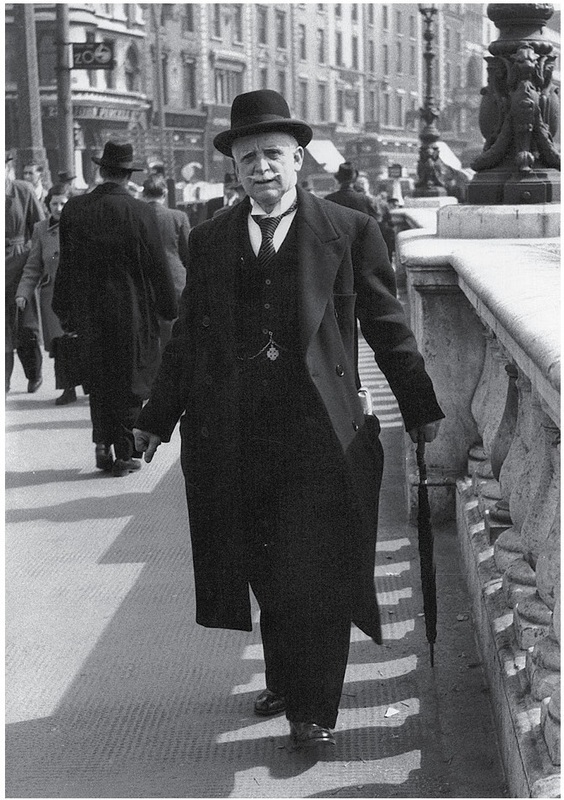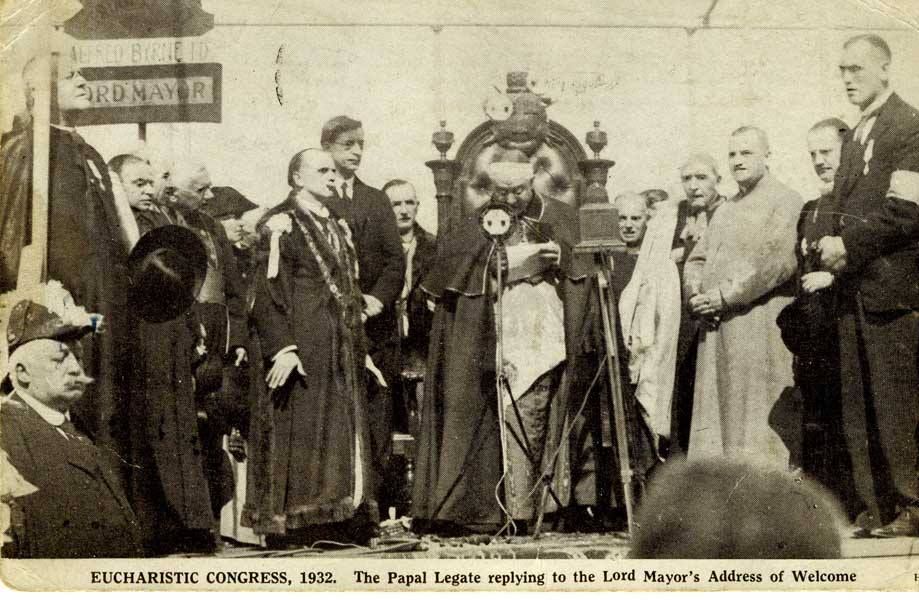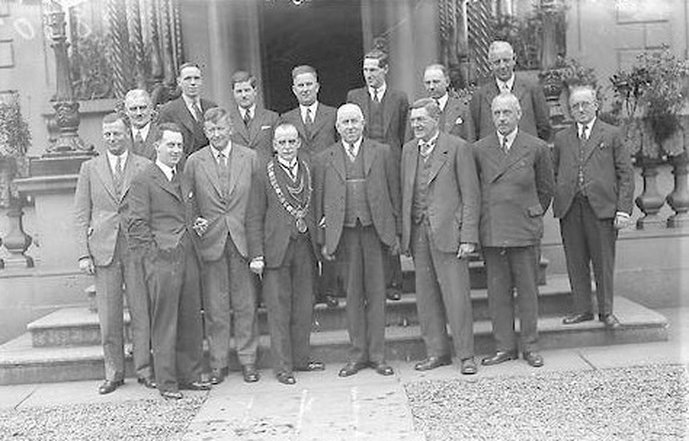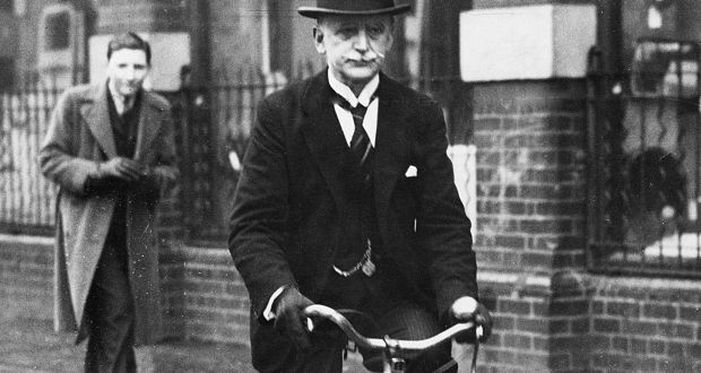Alfie Byrne (17 March 1882 – 13 March 1956)
Lord Mayor of Dublin he was known as the "shaking hand of Dublin".
Alfred Byrne, (know as Alfie) a working-class politician who served as the ten times Lord Mayor of Dublin, the son of a docker was born on St. Patrick’s Day in 1882. He worked as a theatre programme seller and barman before buying his own pub, The Vernon in Talbot Street, Dublin. In 1909 he entered politics and won the Dublin Corporation seat for the North Dock at the age of 27. In 1914 he became an Alderman of the City of Dublin. In 1915 he was elected MP for Dublin Harbour on behalf of the Irish Parliamentary Party 1915, which promoted Home Rule.
In 1922, Byrne was elected to the 3rd Dáil as an independent candidate for mid-Dublin and during 1923-28 he held a Dáil seat for Dublin North. As a politician his popularity rested on his concern for the working man. In 1928 he was elected to the Seanad but returned to the Dail in 1932 and represented Dublin North during 1932-37 before moving to the seat in Dublin North-East during 1937-56. In 1930 he was elected Lord Mayor of Dublin and held that post continuously for nine years. Alfie Byrne again served the Citizens of Dublin as Lord Mayor in 1954 and 1955, that was a tenth time he served in the role .
Alfie Byrne died in Dublin in March 1956 and his funeral attracted thousands, especially from the ranks of the poor in the inner city and docklands whose cause he championed through a long and colourful career. The by-election caused by his death, was won by his son Patrick Byrne. Two other sons Alfred P. Byrne and Thomas Byrne were also TDs for various Dublin constituencies in Dublin.
In 1922, Byrne was elected to the 3rd Dáil as an independent candidate for mid-Dublin and during 1923-28 he held a Dáil seat for Dublin North. As a politician his popularity rested on his concern for the working man. In 1928 he was elected to the Seanad but returned to the Dail in 1932 and represented Dublin North during 1932-37 before moving to the seat in Dublin North-East during 1937-56. In 1930 he was elected Lord Mayor of Dublin and held that post continuously for nine years. Alfie Byrne again served the Citizens of Dublin as Lord Mayor in 1954 and 1955, that was a tenth time he served in the role .
Alfie Byrne died in Dublin in March 1956 and his funeral attracted thousands, especially from the ranks of the poor in the inner city and docklands whose cause he championed through a long and colourful career. The by-election caused by his death, was won by his son Patrick Byrne. Two other sons Alfred P. Byrne and Thomas Byrne were also TDs for various Dublin constituencies in Dublin.
Interview with Alfie Byrne Lord Mayor of Dublin.
Alfie Byrne took office as Lord Mayor of #Dublin at the age of 48
he served 9 consecutive years from 1931 to 1938
In 1936 Alfred Byrne was interviewed in an armchair on a lawn - presumably his own - in a suit, and with his chain of office. In that little film of 5.56 mins. entitled “Interview with Mr. Alfred Byrne, Lord Mayor of Dublin”,
Text of Alfie Byrne interview as follows:
‘Ladies and Gentlemen, I am privileged today owing to the kindness of courtesy of Mssrs. Pathe Gazette to address a few words to you. Frequently I have crossed the water as well as being across the border to Northern Ireland and when I went to England I have been asked many times what is the matter with Ireland? I have just been reminded that this is the sixth year of the mayoralty of the city of Dublin and this chain that you see is the same chain worn by Daniel O’Connell in 1847 and because I am Lord Mayor of Dublin a very large number of people think that I can tell them what is the matter with Ireland. But let me assure everybody in this house and all my friends who are listening that there are no animosities between - at any rate no serious animosities between - the Irish and the British people. Neither are there any great animosities between out people in southern and in northern Ireland I am hopeful that the day is not far distant when they can be got together to work as one man for the prosperity of the whole country and its people. However let me remind you of the position as I see it,. I cannot imagine prosperity coming to this country until by agreement that festering sore that is really a danger to our country as well as to England - I refer to the removal of the border between North and Southern Ireland. If we can get that border removed by consent and if our people as I said before will settle down, I am satisfied it will be to the benefit of England as well as to our people in Ireland. It will be to our benefit because I think our politicians, our leaders of people, our public speakers, who to my mind are doing much harm by abusing one another, by using language on the platforms that’s not a credit to our country. You’ve often heard it yourselves, that if you chance to differ with a man who is aiming as you are aiming for the freedom of this country and for its betterment, if you do not agree with him, he shouts out the word “Traitor”. Now, I think we have had too much of that language and calling names and giving abuse to one another will not bring prosperity or will not help our unemployed people. It should be all our aim to bring friendship between the peoples of Great Britain and Ireland and then avail to the full of the market that can be offered and when that day comes all the young men in Ireland who have left the land to go to towns and cities, they may be in a position to go back to the land and be provided with a decent means of living that you and I and all the people earnestly desired them to have. Now, if we hated each other a little less than what we do today, and if we did not exaggerate our admiration of those whom we agree with, and if we had a little less condemnation of our friends as well as our opponents I think it would be to the advantage of the whole country. This little country of ours cannot continue to keep two parliaments with two big sets of officials going, and if I can be of the slightest service now or at any time in bringing people together that will (bring) remove that that border it will be the one ambition of my life and as I said already to you, I hope the day is not far distant when they will get together and think of the unemployed and think of the future of the country regardless of what it means to themselves and their public positions.’
‘Ladies and Gentlemen, I am privileged today owing to the kindness of courtesy of Mssrs. Pathe Gazette to address a few words to you. Frequently I have crossed the water as well as being across the border to Northern Ireland and when I went to England I have been asked many times what is the matter with Ireland? I have just been reminded that this is the sixth year of the mayoralty of the city of Dublin and this chain that you see is the same chain worn by Daniel O’Connell in 1847 and because I am Lord Mayor of Dublin a very large number of people think that I can tell them what is the matter with Ireland. But let me assure everybody in this house and all my friends who are listening that there are no animosities between - at any rate no serious animosities between - the Irish and the British people. Neither are there any great animosities between out people in southern and in northern Ireland I am hopeful that the day is not far distant when they can be got together to work as one man for the prosperity of the whole country and its people. However let me remind you of the position as I see it,. I cannot imagine prosperity coming to this country until by agreement that festering sore that is really a danger to our country as well as to England - I refer to the removal of the border between North and Southern Ireland. If we can get that border removed by consent and if our people as I said before will settle down, I am satisfied it will be to the benefit of England as well as to our people in Ireland. It will be to our benefit because I think our politicians, our leaders of people, our public speakers, who to my mind are doing much harm by abusing one another, by using language on the platforms that’s not a credit to our country. You’ve often heard it yourselves, that if you chance to differ with a man who is aiming as you are aiming for the freedom of this country and for its betterment, if you do not agree with him, he shouts out the word “Traitor”. Now, I think we have had too much of that language and calling names and giving abuse to one another will not bring prosperity or will not help our unemployed people. It should be all our aim to bring friendship between the peoples of Great Britain and Ireland and then avail to the full of the market that can be offered and when that day comes all the young men in Ireland who have left the land to go to towns and cities, they may be in a position to go back to the land and be provided with a decent means of living that you and I and all the people earnestly desired them to have. Now, if we hated each other a little less than what we do today, and if we did not exaggerate our admiration of those whom we agree with, and if we had a little less condemnation of our friends as well as our opponents I think it would be to the advantage of the whole country. This little country of ours cannot continue to keep two parliaments with two big sets of officials going, and if I can be of the slightest service now or at any time in bringing people together that will (bring) remove that that border it will be the one ambition of my life and as I said already to you, I hope the day is not far distant when they will get together and think of the unemployed and think of the future of the country regardless of what it means to themselves and their public positions.’
British Pathe News Video of Alfie Byrne
|
|
|
